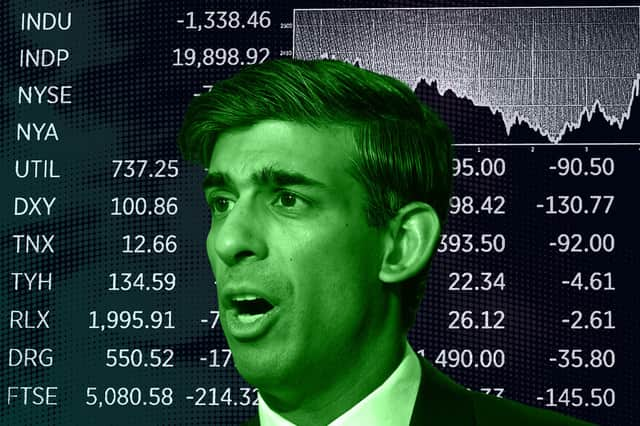COP26: Why Rishi Sunak’s plan to make the finance sector greener doesn’t go far enough


Yesterday (3 November) was a day of speeches, announcements, figures and promises. The third day of COP26, the pivotal climate change summit, was otherwise known as ‘Finance Day’ and the conversation revolved around the financial and economic aspects of environmental policy.
The Chancellor, Rishi Sunak, used phrases like “rewire the entire global financial system for net zero”.
Advertisement
Hide AdAdvertisement
Hide AdDon’t get me wrong, this is exactly what needs to be done and, as someone who created a financial advisory firm with the express purpose of using savings, investments and pensions to tackle climate change, I welcome the fact that, for a day, it was the centre of conversation. But, let’s dig a little deeper.
Sunak cited private investment as one way finance ministers will “direct the world’s wealth to protect our planet”. Mark Carney told us that USD130tn is now pointing at Net Zero. But how can we hold the finance industry accountable for delivering on these targets and commitments?
“You can’t manage what you can’t measure,” as the old adage goes. So, we are calling for more clear and standardised measures and regulation to make policing easier and to create much needed visibility around actions companies are making.
It’s wise also to remember that investment is often about short-term pain to achieve long-term gain. We have to shoot for an investment in Net Zero. That may mean around 3.3C of warming in the short-term, to invest in what is necessary. For example, to build a wind turbine in the first place, you need to invest in energy to put yourself in a place where the long-term 1.5C becomes possible.
Advertisement
Hide AdAdvertisement
Hide AdPension funds are not, and cannot be, aligned to 1.5C today unless the only investments that are made are into industries like IT. We need to decarbonise energy, transport, cement, agriculture and other sectors - that’s where the problem lies, and that’s where our money needs to go.
Calling out greenwashing
What I do welcome from Sunak’s speech is the emphasis on stamping out greenwashing, which is rife in the financial sector when it comes to environmental and ethical commitments. It’s what I call the ‘50 shades of green problem’. When nothing is in place to really define what green is, it’s easy for a private institution or fund manager to claim they’re green when really, they could be anything but.
He outlined how listed companies and financial institutions will be forced to publish their climate impact and plans on how they will go green by 2023. However, rather than bringing an independent expert taskforce to assess this, Sunak also said how the government would leave it up to the market to determine if transition plans put forward by firms are adequate or credible.
This could lead to a ‘marking your own homework’ situation, and - as Greenpeace said - “leave plenty of wiggle room for financial institutions to continue with business as usual”.
Advertisement
Hide AdAdvertisement
Hide AdSo, the right things are being said - which is the first step. But while the governmental approach seems to have good intentions, its statistics are exaggerated, its plan is wishy-washy and its timeframe is lengthy.
What can we do now?
Does that mean we just wait until the next big environmental summit for more progress? Absolutely not. The climate crisis is urgent, it is here now and we need to act.
Every single person has the power to change things. In fact, recent research revealed that by moving your pension from a conventional fund - which could be propping up industries such as coal mining, oil extraction and animal testing - to one that is investing in solutions to the world’s problems - such as reforestation, clean water and renewable energy - you could have 21 times more impact than all lifestyle changes, like going vegan or stopping flying, combined.
Of course, savings, pensions and investments are complicated and - let’s face it - boring. Add a layer of sustainability over that and the picture becomes a lot more blurred. But the right financial adviser can show you what your finances look like now, and help you to get them to a point where you’re proud to show others.
Advertisement
Hide AdAdvertisement
Hide AdCOP26 may have brought this topic to the forefront of the public agenda, but it’s down to the individual sitting in their house right now to make a difference today.
David Macdonald is founder of Path Financial, the UK’s first financial advisory firm set up with tackling the climate crisis through savings, pensions and investments as its express purpose. Path Financial is based in East Sussex, but has advisers all over the UK helping people in their local community to realise the power of their pursestrings.
Comment Guidelines
National World encourages reader discussion on our stories. User feedback, insights and back-and-forth exchanges add a rich layer of context to reporting. Please review our Community Guidelines before commenting.